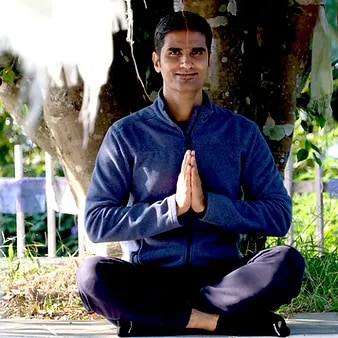Embracing Karma Yoga: A Path of Selfless Action & Inner PeaCE
by Hardik Mehta

Embracing Karma Yoga: A Path of Selfless Action & Inner Peace
In the fast-paced, goal-oriented society we live in, the ancient practice of Karma Yoga offers a refreshing perspective on how to live a meaningful and fulfilling life. Rooted in Hindu philosophy and outlined in sacred texts like the Bhagavad Gita, Karma Yoga, or the “Yoga of Action,” emphasizes selfless service and detachment from the fruits of our actions. By integrating the principles of Karma Yoga into our daily lives, we can foster inner peace, personal growth, and a positive impact on the world around us.
Understanding Karma Yoga
The term “Karma” derives from the Sanskrit root “Kri,” which means “to do” or “to act.” Therefore, Karma Yoga can be understood as the path of selfless action performed with mindfulness and a sense of duty, without attachment to the results. Unlike other forms of yoga that might focus more on physical postures, breath control or meditation, Karma Yoga is about transforming everyday activities into a form of spiritual practice. To act with integrity, do what needs to be done and leave the results to a higher power. By doing so, individuals can attain spiritual liberation and inner peace. According to the Bhagavad Gita, true spiritual growth comes not from renouncing the world but from engaging in it with the right attitude.
The Philosophy Behind Karma Yoga
Karma Yoga is based on the idea that every action has consequences and these consequences create our future experiences. This is known as the law of karma. However, by performing actions selflessly and without any expectation of reward, one can transcend the cycle of karma and move closer to spiritual enlightenment.
This practice encourages the cultivation of four key attitudes:
- Right Intent: Actions should be motivated by compassion, kindness, and a sense of duty rather than personal gain.
- Detachment: While performing actions, one should remain unattached to the results, understanding that outcomes are not entirely within one’s control.
- Equanimity: Maintaining a balanced state of mind regardless of success or failure helps cultivate inner peace and resilience.
- Selflessness: Actions should be performed for the benefit of others, contributing to the welfare of the community and the world at large.
Practical Application of Karma Yoga
Incorporating Karma Yoga into modern life requires a shift in mindset and intentional practice. Here are some ways to embrace Karma Yoga in today’s world:
- Mindful Work: Approach your job with a sense of purpose and dedication. Regardless of the nature of your work, performing it with integrity and mindfulness can turn it into a spiritual practice. Focus on doing your best without fixating on promotions, raises, or recognition.
- Volunteerism: Dedicate time to volunteer for causes you are passionate about. Whether it’s helping at a local shelter, participating in community clean-ups, or supporting educational initiatives, volunteering embodies the spirit of selfless service.
- Acts of Kindness: Simple, everyday acts of kindness can have a profound impact. Smile at strangers, hold the door open for someone, or lend a listening ear to a friend in need. These small gestures contribute to a more compassionate world.
- Sustainable Living: Make conscious choices that benefit the environment. Reducing waste, recycling, and supporting eco-friendly products are ways to practice Karma Yoga by contributing to the well-being of the planet.
- Community Engagement: Get involved in your local community. Attend town meetings, support local businesses, and participate in neighborhood initiatives. Engaging with your community fosters a sense of belonging and collective responsibility.
- Professional Integrity: Uphold ethical standards and integrity in your professional life. Avoid shortcuts or dishonest practices, and strive to contribute positively to your workplace and industry.
- Letting Go of Results: After putting in your best effort, release attachment to the outcome. Trust that the universe will handle the results as they are meant to be.
- Cultivate Gratitude: Appreciate the opportunity to serve and the chance to make a difference. Gratitude helps shift the focus from what is lacking to what is abundant in life.
Benefits of Practicing Karma Yoga
Adopting the principles of Karma Yoga brings numerous benefits, both personally and collectively:
- Inner Peace: By letting go of attachment to results and focusing on the action itself, one can experience a profound sense of peace and contentment. This mindset helps alleviate the stress and anxiety associated with the constant pursuit of success.
- Personal Growth: Karma Yoga encourages self-improvement and the development of virtues such as patience, humility and generosity. Engaging in selfless actions helps individuals grow spiritually and emotionally.
- Improved Relationships: Selfless actions and a compassionate attitude enhance relationships with family, friends and colleagues. By prioritizing the well-being of others, we foster trust and harmony in our interactions.
- Social Impact: When individuals collectively practice Karma Yoga, the ripple effect creates a more compassionate and just society. Acts of service and kindness contribute to the well-being of communities and the environment.
- Spiritual Development: Ultimately, Karma Yoga aids in spiritual growth by purifying the mind and heart. It helps individuals connect with their higher selves and align their actions with their spiritual values.
- Reduced Stress: The practice helps alleviate stress and anxiety that often stem from worrying about outcomes. It fosters a sense of trust in the natural flow of life.
Overcoming Challenges in Practicing Karma Yoga
While the principles of Karma Yoga are simple, their practice can be challenging in a world that often emphasizes individual success and material gain. Here are some strategies to overcome these challenges:
- Cultivating Patience: Understand that spiritual growth and the benefits of Karma Yoga may not be immediate. Practice patience and trust in the process.
- Maintaining Consistency: Make Karma Yoga a consistent part of your life by setting aside regular time for selfless activities and mindfulness practices.
- Balancing Self-Care: While selflessness is central to Karma Yoga, it’s also important to care for your own well-being. Ensure that your actions do not lead to burnout or neglect of your own needs.
- Seeking Community: Surround yourself with like-minded individuals who share similar values. Engaging with a community of practitioners can provide support, inspiration, and accountability.
- Reflecting Regularly: Take time to reflect on your actions and motivations. Regular self-reflection helps ensure that your actions remain aligned with the principles of Karma Yoga.
The practice of Karma Yoga reminds us that true success lies not in what we achieve but in how we serve others and live our lives with integrity and compassion.
In the words of Mahatma Gandhi, “The best way to find yourself is to lose yourself in the service of others.” This encapsulates the essence of Karma Yoga—a path that not only benefits the practitioner but also fosters a more compassionate and harmonious world.
Sayujya Yoga is renowned as the best yoga institute in Mumbai, India, offering a comprehensive and holistic approach to wellness. The institute’s focus on Karma Yoga emphasizes selfless action and mindfulness, promoting inner peace and personal growth. At Sayujya Yoga, students explore a wide range of practices, including asanas, pranayama, and meditation, tailored to individual needs. The experienced instructors guide each student on a journey towards physical, mental, and spiritual well-being. Whether you’re a beginner or an advanced practitioner, Sayujya Yoga provides a nurturing environment to deepen your practice and connect with your true self. Join Sayujya Yoga’s 200 hours TTC for a transformative experience.
About the Author

Hardik Mehta
Hardik is an E-RYT 500 & YACEP (Yoga Alliance Continuing Education Provider), Yoga Alliance, USA. He has been practicing yoga for the last 9 years. Prior to finding his true calling in Yoga, he was working with various corporates for 12 years in the Retail and eCommerce sector.
